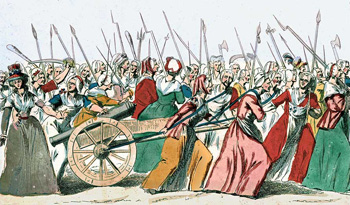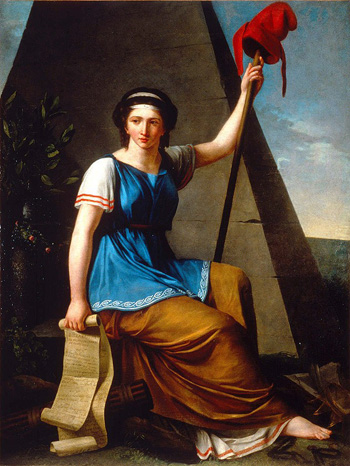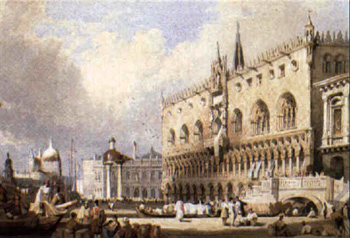Catholic Virtues
 |
 |
 |
 |
 |
 |
 |
True & False Paths to Happiness - XIII
A Well-Ordered Temporal Society Is
A Symbol of God
As established in the last article, there is a sacral aspect in the temporal society that should be the object of our contemplation in order to know God's creation more perfectly.
Obviously, we must be open above all to the contemplation of God in the mysteries of the life of Our Lord Jesus Christ, Our Lady, the Church and other religious themes. These subjects, however, lie outside the scope of this study, which has as its object the order of the temporal universe. For this reason, I will not address them here.

 One could immediately object: Since the religious sphere is so far above the temporal, there is no need to waste time on the latter!
One could immediately object: Since the religious sphere is so far above the temporal, there is no need to waste time on the latter!
This is not so. Often, the errors that afflicted the Church throughout her History were born in temporal society. For example, the worst tendencies of modern Progressivism emanate directly from the spirit of the French Revolution.
In addition, there is an elementary fact that is easily verifiable: At least 80% of the life of an ordinary Catholic layman is not spent in the church, but inside civil society. Further, temporal matters are more often than not decisive in the life of a person.
But there is more. A well-ordered temporal society is a symbol of God and the order God has placed in the universe. As such, it helps to make souls more receptive to virtue and more modeled by it.
Pius XII reproved "a certain spiritualism," which, "once adopted in the Catholic sphere, causes grave damage to the cause of Christ and the Divine Creator of the universe." He is quite clear: "To intervene in the world to maintain the divine order is a right and a duty, which are intrinsically the responsibility of the Christian" [emphasis added]. (1957 Christmas radio message)
In other words, the layman's horizon cannot be limited to his own spiritual life. The meaning of earthly life is not restricted to making an accommodation to this world, whereby the Church and her children can live comfortably with a minimum order.
In other words, temporal society is not the hotel of the Church. At first glance, for many it may seem that way, given the divine character of the Church and her transcendental importance. It could be seen even as an honor for the temporal society to exercise this role. But this formulation is a good deal too simple.
In the great waters of spiritual contemplation, we have many treaties by Saints and great authors. The same is not true, however, in the field of earthly life, which is, nonetheless, of fundamental importance.
 Although we should be great admirers of the Saints who restricted their action to the religious sphere, it is natural that the activity of laymen is particularly focused on the temporal world.
Although we should be great admirers of the Saints who restricted their action to the religious sphere, it is natural that the activity of laymen is particularly focused on the temporal world.
In addition to the directly religious aspect of a life of Catholic piety, our spirit should rise to much higher elucubrations without ever losing our sense of the reality in which we act. This does not mean we should allow ourselves to fall into useless and sterile daydreams or fantasies, but rather that we should commit ourselves to delve continually into the things of God.
Therefore, for there to be Catholic life in society – that is, for there to be Catholic culture, Catholic art, Catholic family life, Catholic environments, Catholic traditions – the participation of lay Catholics in the temporal sphere is of utmost consequence. "To intervene in the world," as Pius XII said, is extremely important for the formation or deformation of the faithful. And it is necessary to dedicate a proportional attention to its importance.
The secular onslaught opposes sacralization
There is a key word to understand, by contrast, both what sacral means and to what precisely it refers when speaking about contemplation. That word is laicism.

 The word laicism can have different interpretations. One corresponds to the distinction between the spiritual and the temporal spheres, following the principle enunciated by Our Lord Jesus Christ: "Give to Caesar what is Caesar's, and to God what is God's" (Mt 22:21; Mk 12:17; Lk 20:25). The last Popes have designated this distinction as a healthy secularism.
The word laicism can have different interpretations. One corresponds to the distinction between the spiritual and the temporal spheres, following the principle enunciated by Our Lord Jesus Christ: "Give to Caesar what is Caesar's, and to God what is God's" (Mt 22:21; Mk 12:17; Lk 20:25). The last Popes have designated this distinction as a healthy secularism.
Another interpretation is that of State agnosticism, which wants to construct a world as if God did not exist. This conception has been condemned by all the Popes since Gregory XVI in the 19th century, when the question was more acute.
It will be useful, albeit in passing, to take a quick look at the secular onslaught that infects our day, which is the opposite of what we would desire. Often it is easier to understand a concept by comparing it with its opposite.
An agnostic State does not recognize any religion and is, therefore, indifferent about religious matters. This implies a relativistic position toward truth and error, good and evil, beauty and ugliness. Now, a State without an ideal of truth and beauty is like a guide or a traveler who wanders aimlessly, or an artist who paints or sculpts without the intention of representing any figure.
Such an aimless State is precisely what secularism is imposing upon the whole world.
Sadly, many who were born in such a world have already accustomed themselves to it. Against such a man we make our protest, which is an act of reparation for the injury against God, a proclamation of non-conformity to this mindset and, even more, a pre-announcement of the final victory of Our Lord Jesus Christ.
The pagan idols of modern secularism
Secularism is increasingly widespread and invasive. It has pervaded mentalities, culture, art, social relations, in a word, our entire life. Now, in this regard, secularization actually means paganization.
It wants to obstruct freedom of conscience, the defense of the family and the right to educate one's children according to Catholic Morals. Catholic Morals is excluded from the panorama of a nation in an attempt to annul the distinction between good and evil.
 To the degree that the God-Man is pushed into the shadows, the place left empty by Him is filled with very concrete, palpable “values” that are sometimes glorified as if they were pompous abstractions: the Economy, Health, Sex, the Machine, and so many others.
To the degree that the God-Man is pushed into the shadows, the place left empty by Him is filled with very concrete, palpable “values” that are sometimes glorified as if they were pompous abstractions: the Economy, Health, Sex, the Machine, and so many others.
Contrary to what happened in the classical times, these "values" are neither personified in gods nor embodied in statues. This does not, however, prevent them from being authentic pagan idols of our unfortunate secularized world.
There is no reason, therefore, not to call it paganism, because the idols are there!
The Church's condemnation of secularism should move us for two reasons: First, it favors the fight against the anti-Catholic forces; second, it confirms the thesis that the temporal sphere must also reflect the greatness of God Most High.
Continued

Obviously, we must be open above all to the contemplation of God in the mysteries of the life of Our Lord Jesus Christ, Our Lady, the Church and other religious themes. These subjects, however, lie outside the scope of this study, which has as its object the order of the temporal universe. For this reason, I will not address them here.

The French Revolution influence the spiritual sphere: above, the March on Versaille; below, Lady Liberty surrounded by masonic symbols

This is not so. Often, the errors that afflicted the Church throughout her History were born in temporal society. For example, the worst tendencies of modern Progressivism emanate directly from the spirit of the French Revolution.
In addition, there is an elementary fact that is easily verifiable: At least 80% of the life of an ordinary Catholic layman is not spent in the church, but inside civil society. Further, temporal matters are more often than not decisive in the life of a person.
But there is more. A well-ordered temporal society is a symbol of God and the order God has placed in the universe. As such, it helps to make souls more receptive to virtue and more modeled by it.
Pius XII reproved "a certain spiritualism," which, "once adopted in the Catholic sphere, causes grave damage to the cause of Christ and the Divine Creator of the universe." He is quite clear: "To intervene in the world to maintain the divine order is a right and a duty, which are intrinsically the responsibility of the Christian" [emphasis added]. (1957 Christmas radio message)
In other words, the layman's horizon cannot be limited to his own spiritual life. The meaning of earthly life is not restricted to making an accommodation to this world, whereby the Church and her children can live comfortably with a minimum order.
In other words, temporal society is not the hotel of the Church. At first glance, for many it may seem that way, given the divine character of the Church and her transcendental importance. It could be seen even as an honor for the temporal society to exercise this role. But this formulation is a good deal too simple.
In the great waters of spiritual contemplation, we have many treaties by Saints and great authors. The same is not true, however, in the field of earthly life, which is, nonetheless, of fundamental importance.

From the Doge's Palace in Venice came an upright ordering of the city-state
In addition to the directly religious aspect of a life of Catholic piety, our spirit should rise to much higher elucubrations without ever losing our sense of the reality in which we act. This does not mean we should allow ourselves to fall into useless and sterile daydreams or fantasies, but rather that we should commit ourselves to delve continually into the things of God.
Therefore, for there to be Catholic life in society – that is, for there to be Catholic culture, Catholic art, Catholic family life, Catholic environments, Catholic traditions – the participation of lay Catholics in the temporal sphere is of utmost consequence. "To intervene in the world," as Pius XII said, is extremely important for the formation or deformation of the faithful. And it is necessary to dedicate a proportional attention to its importance.
The secular onslaught opposes sacralization
There is a key word to understand, by contrast, both what sacral means and to what precisely it refers when speaking about contemplation. That word is laicism.

Modern man is relativist toward Catholic Morals: above, an abortion clinic; below, a 'gay' rights rally

Another interpretation is that of State agnosticism, which wants to construct a world as if God did not exist. This conception has been condemned by all the Popes since Gregory XVI in the 19th century, when the question was more acute.
It will be useful, albeit in passing, to take a quick look at the secular onslaught that infects our day, which is the opposite of what we would desire. Often it is easier to understand a concept by comparing it with its opposite.
An agnostic State does not recognize any religion and is, therefore, indifferent about religious matters. This implies a relativistic position toward truth and error, good and evil, beauty and ugliness. Now, a State without an ideal of truth and beauty is like a guide or a traveler who wanders aimlessly, or an artist who paints or sculpts without the intention of representing any figure.
Such an aimless State is precisely what secularism is imposing upon the whole world.
Sadly, many who were born in such a world have already accustomed themselves to it. Against such a man we make our protest, which is an act of reparation for the injury against God, a proclamation of non-conformity to this mindset and, even more, a pre-announcement of the final victory of Our Lord Jesus Christ.
The pagan idols of modern secularism
Secularism is increasingly widespread and invasive. It has pervaded mentalities, culture, art, social relations, in a word, our entire life. Now, in this regard, secularization actually means paganization.
It wants to obstruct freedom of conscience, the defense of the family and the right to educate one's children according to Catholic Morals. Catholic Morals is excluded from the panorama of a nation in an attempt to annul the distinction between good and evil.

Modern day idols of secularism
Contrary to what happened in the classical times, these "values" are neither personified in gods nor embodied in statues. This does not, however, prevent them from being authentic pagan idols of our unfortunate secularized world.
There is no reason, therefore, not to call it paganism, because the idols are there!
The Church's condemnation of secularism should move us for two reasons: First, it favors the fight against the anti-Catholic forces; second, it confirms the thesis that the temporal sphere must also reflect the greatness of God Most High.
Continued

Posted July 20, 2020





